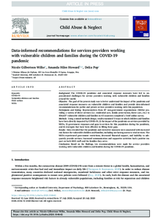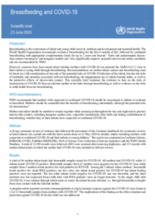Displaying 1301 - 1310 of 4424
The goal of the present study was to better understand the impact of the pandemic and associated response measures on vulnerable children and families and provide data-informed recommendations for public and private service providers working with this population.
To address the growing need for information and action among global adolescents, WHO and PMNCH are launching a new series, “Adolescent health and well-being in times of COVID-19. The first Live Series will focus on school reopening.
The authors of this comment explore their initial analyses and estimates regarding the impacts of the COVID-19 pandemic on children's nutrition and note that these projections emphasise the crucial need for actions to protect child nutrition.
This comment piece from the Lancet describes the impacts of the COVID-19 pandemic on children's nutrition, noting that vulnerable families, particularly in low- and middle-income countries (LMICs) are struggling to access the food and services they need in the context of an economic downturn.
"Stay-at-home and lockdown measures have helped to contain the greatest public-health threat the world has seen in decades," says this article from the Bangkok Post. "But as Covid-19 receded in many countries, a new public-health crisis was emerging behind closed doors, with increased domestic violence against women and children."
In this How We Care series webinar, Family for Every Child members CPTCSA (Philippines), Paicabi (Chile) and Butterflies (India) come together to discuss the work they are doing to address child sexual abuse in their contexts.
This scientific brief examines the evidence to date on the risks of transmission of COVID-19 from an infected mother to her baby through breastfeeding as well as evidence on the risks to child health from not breastfeeding.
This video series from UNICEF shares the stories of young girls living through COVID-19 – coping with the fears of child marriage, the struggles of distance learning, and the burden of isolation.
"A new survey issued by the International Rescue Committee (IRC) to staff working on the front lines of child protection services within 17 countries impacted by conflict or crisis finds that child protection concerns have increased among 55% of respondents," says this press release from IRC.
This webinar will examine the Spanish incident as a case study for why governments should consult child protection advisers when loosening lockdown orders.


